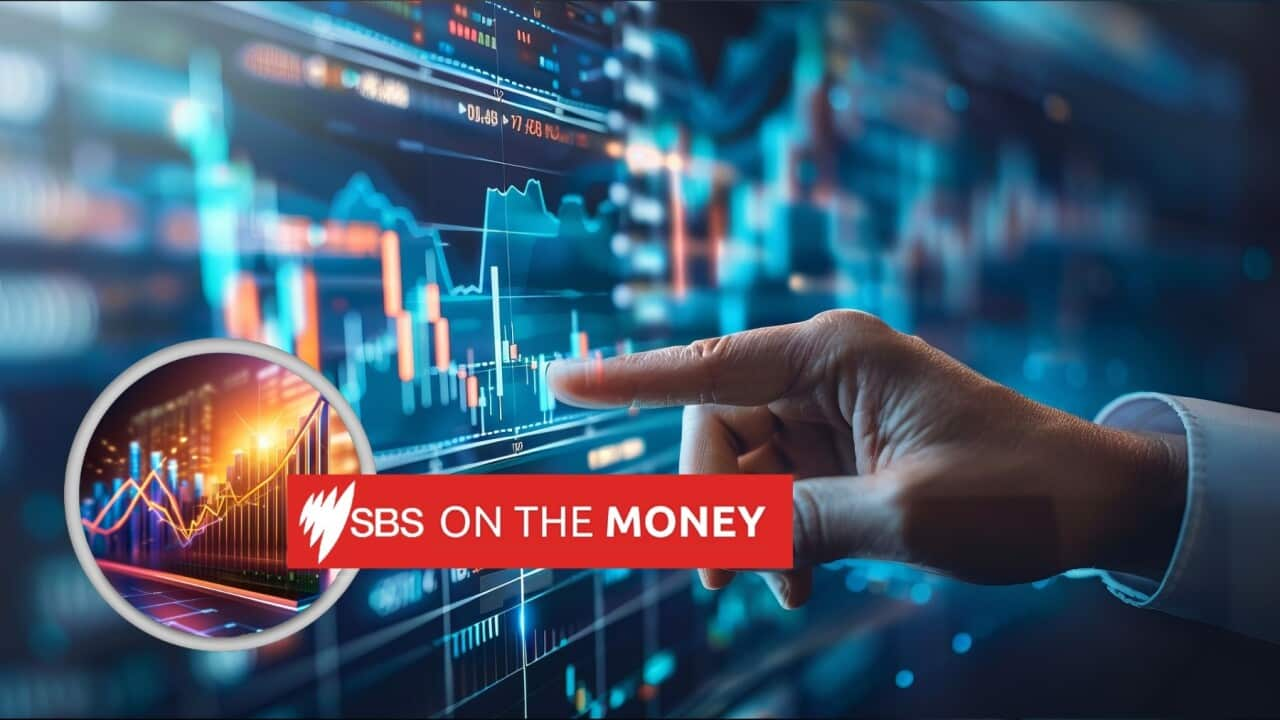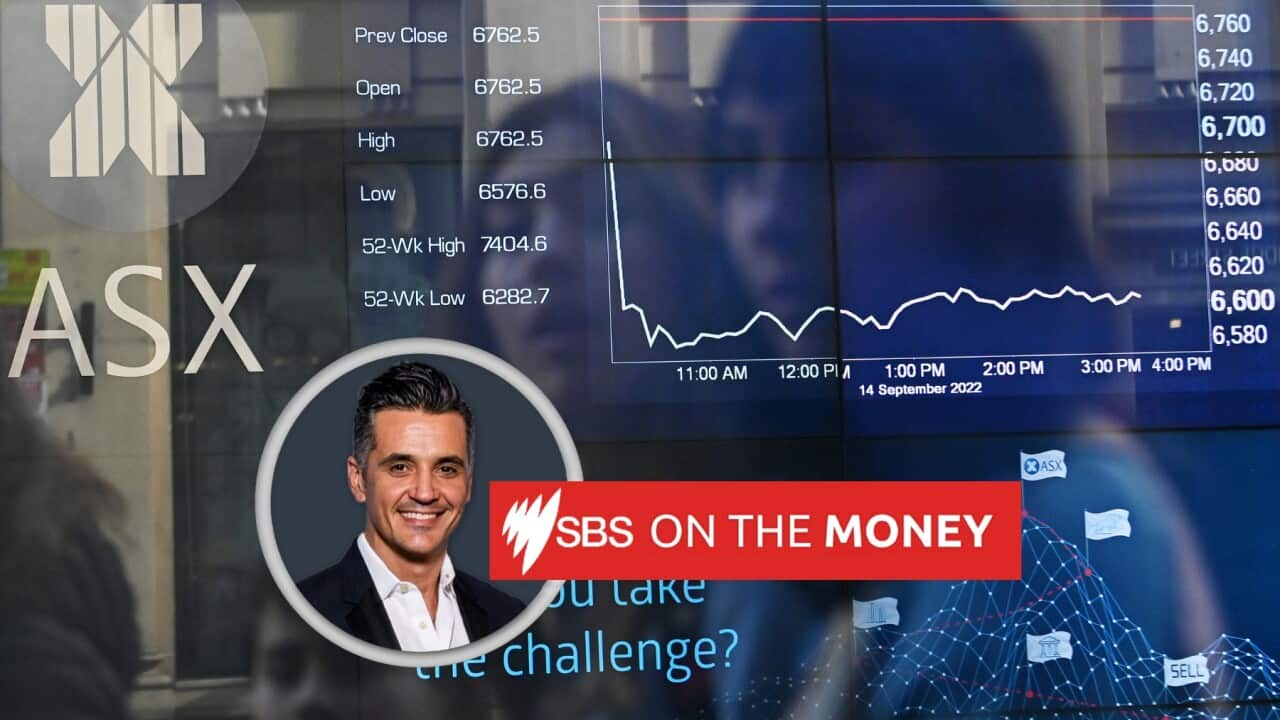Listen to Australian and world news, and follow trending topics with SBS News Podcasts.
ASX in the red; RBA warns of longer inflation fight

Source: SBS News
The Australian share market has closed 0.3% down following a soft session. Stephanie Youssef spoke with Mathan Somasundaram, the CEO of Deep Data Analytics, who says overseas trade developments are having an impact on investor behaviour. Plus, Reserve Bank Governor Michele Bullock warns it could take longer to tame underlying inflation in her annual address to the Anika Foundation.
Speaker 1
You're listening to SBS on the Money with Ricardo Gonçalves.
Stephanie Yousaf
Hello and welcome to the On the Money podcast. It's Thursday, the 24th of July. I'm Stephanie Yousaf, filling in for Ricardo Gonçalves. Today, the ASX has closed 0.3% lower. I'll have a bit more on that a little later with Mathan Somasundaram.
Stephanie Yousaf
But first, the Reserve Bank governor has defended the central bank's cautious approach to cutting interest rates, warning it could take longer to get underlying inflation under control. It was part of her annual Annika Foundation speech that she delivered in Sydney today. Let's take a listen to some of what she had to say.
Reserve Bank Governor Michele Bullock
Over the past couple of years, we have made meaningful progress in bringing inflation down. Higher interest rates have been working to bring aggregate supply and demand closer towards balance.
Reserve Bank Governor Michele Bullock
We expect headline inflation in the June quarter to be in the lower half of our 2 to 3% target range, uh, but that's headline, and that partly reflects ongoing effect of temporary cost of living relief.
Reserve Bank Governor Michele Bullock
As that relief unwinds, we expect headline inflation to pick up to around the top of the band by the end of this year and into the first part of 2026.
Reserve Bank Governor Michele Bullock
So to help look through some temporary factors like this, we also pay close attention to trim mean inflation or underlying inflation, and that's published quarterly.
Reserve Bank Governor Michele Bullock
And that provides a good guide to underlying inflation trends.
Reserve Bank Governor Michele Bullock
And I, and I'm pleased to say this measure is also easing, but it's still a bit higher than headline inflation. It was at 2.9% in the March quarter, with year-ended trim mean under 3% for the first time since 2021, so that was very pleasing.
Reserve Bank Governor Michele Bullock
We do expect trim mean inflation to fall a little further in the June quarter and year-ended terms.
Reserve Bank Governor Michele Bullock
However, the monthly CPI indicator data which are volatile, suggests the fall maybe not quite as much as we forecast back in May. We still think it will slow uh show inflation declining slowly towards 2.5%, but we are looking for data to support this expectation.
Reserve Bank Governor Michele Bullock
Now encouragingly as inflation slowed, the labour markets eased only gradually and the unemployment rate is relatively low. I'll have more to say on developments in the labour market later.
Reserve Bank Governor Michele Bullock
Since February, we've reduced the cash rate by 50 basis points.
Reserve Bank Governor Michele Bullock
The board continues to judge that a measured and gradual approach to monetary easing is appropriate. Global economic and policy developments have so far been largely in line with our May baseline forecasts.
Reserve Bank Governor Michele Bullock
And the likelihood of a severe downside trade war appears to have diminished a bit.
Reserve Bank Governor Michele Bullock
But there's still uncertainty and unpredictability in the global economy.
Reserve Bank Governor Michele Bullock
The board's view is that monetary policy is well placed to respond decisively to adverse international developments if it's needed.
Stephanie Yousaf
That was Reserve Bank Governor Michelle Bullock speaking in Sydney. Turning back to the Australian share market, which finished in the red today, the ASX 200 shed almost 28 points to end at 8,709 points. 10 of the 11 sectors ended lower with only healthcare in the green. I spoke to Mathan Somasundaram from Deep Data Analytics, who says overseas trade developments are having an impact on investor behaviour.
Mathan Somasundaram
Well, we had a bit of a bounce yesterday, and that kind of flowed into for the Japanese trade deal and that kind of had an optimism play out in the US as well. The details of those kind of trade deals are always murky. The Japanese prime minister was supposed to resign and then he said he's not resigning, and the Japanese government, I was actually in Japan earlier this month.
Mathan Somasundaram
So it was actually an interesting timeframe all of this to happen. Um, the Japanese government has lost um their, I guess, majority on the upper house. They lost the lower house last year. So even if there is some kind of deal, it still has to go through the parliament, I guess the houses, and they don't have the majority. So it's going to get tricky and so the market is starting to, um, I guess digest that and the optimism about
Mathan Somasundaram
The Japanese trade deal flagging that potentially that's going to set the tone for a European deal, that's got a bit more spicy. So that's that's why the market is rolling over and we haven't seen the follow through in the commodities as much as most people expected.
Stephanie Yousaf
As you mentioned, the US and Japanese stocks are high off the back of that trade deal, and it appears that that Europe and the US are nearing a deal. Does that potentially signal an easing of these global trade tensions that have dominated the markets this
Mathan Somasundaram
year? Yeah, this is an interesting one. you know, our view has been from the start, US just started the trade war to hide the fact that
Mathan Somasundaram
They wanted to put a GST type tax on US consumers. Um, so the easiest way to say it is everyone else is paying, you're not paying, but you know, we all know that it's the Americans that are paying it. Um, so they started with a base case scenario around 10% and put ridiculous numbers that no one was going to sustain and then pull back to that number. So generally what we're seeing is most of the countries are going to get 10%. The major trading partners are probably going to get 10 to 15%.
Mathan Somasundaram
Um, China's probably going to come down to 20%. China is holding rare earth as a bargaining chip, which America has no choice but to play ball. Um, you know, ignoring all the spin, Americans are probably going to face somewhere around 15%.
Mathan Somasundaram
GST type tax on all the goods that are coming from outside, which is the majority of it, so that's what the government has been trying to put in uh to basically fund the tax cut, which it's not going to fund it, but at least it looks like it's bringing in money. So really we're getting a
Mathan Somasundaram
Americans are getting a GST. If everyone around the world gets a tax around 10 to 15%, it really doesn't change the competitive dynamics of importers going into, sorry, exporters going into the US. So then it doesn't matter for everyone else, it only matters for the US. So in theory it's just a 10 to 15% tax on US consumers.
Mathan Somasundaram
And that's where we're going to settle, so we'll probably get a few more rumbles. People will, you know, scared to talk up and down, but in the end they'll settle down. Europe will probably come down to 15%, Canada and Mexico will probably settle around 15% or 20%, and China will probably go to 20%.
Stephanie Yousaf
Now all eyes today have been on the RBA governor who's delivered an annual address speaking on inflation and joblessness. Um, does this give us an indication as to how the central bank might act over the coming months and in terms of rate cuts, and in turn how markets could, um, could react?
Mathan Somasundaram
Yeah, I think it's a tough game. Uh, she's inherited, uh, you know, she's damned if she does, damned if she doesn't. Uh, so, um, she's trying to manage a complicated mess. Uh, we are, you know, we're sitting in a property bubble. There's zero doubts. I mean, there's property bubble around the world, we're probably one of the worst, uh, and we have what, 95% of our, um, mortgages are, um, variable rates. So we are really on the edgy side of things, so she has to be pretty careful.
Mathan Somasundaram
But unemployment is very low. That's their two main things. So the inflation and unemployment. Inflation has still in their range, so technically they can, but indicators are that it's going up and that's what she said. So that kind of tells you one side of the argument, the other side, and she said the labour market is still quite tight, which is true because if you look at the last 20-30 years.
Mathan Somasundaram
Anything with a 4 in front of it is very low unemployment. I know people are going to say, oh well, it was a 3 before, but the reality is when it was 3, we were doing these massive handouts where the government was paying people to stay at home. So that's not going to happen unless we've got another 1 in 100 year event. So in that context, I think the 4% unemployment is very low. Well, she's got quite a good leeway to let it run to 5% and see.
Mathan Somasundaram
And if she is indicating that trim mean inflation is likely to pick up, then it's, it makes sense for her to hold, which is what they did last time, which surprised the market. Um, but in saying that, the markets are, you know, pretty much pricing in a rate cut coming. Mind you, that's what they did last month too, and it didn't, you know, play out. So it'll be interesting to see. I don't think they should cut because we're not in any situation where the economy is in trouble, barely a scratch on it.
Mathan Somasundaram
Um, and so there's no real reason for us to come. Asset prices are at all-time high, unemployment at near all-time lows. It's just, you know, just insanity that we're thinking about red cup, but it could happen and the market is expecting it, so we'll have to wait and see.
Stephanie Yousaf
Um, what company news is catching your attention today?
Mathan Somasundaram
Yeah, look, we're starting to see some of the consumer stocks come into the market and report really badly. I mean, we had, umulte in the US come out and cut their guidance, and that's the first of the big consumer stocks, and it was hit hard. And similarly we have Bacor in Australia report today, and Babcor got hit by about 20 to 30%. So, um, we're starting to see cracks appear.
Mathan Somasundaram
Consumers are pulling back their spending, which is logical because we're coming through a rising cost of living. People are under pressure. Interest rates are going to remain relatively high, um, despite what central banks say. Um, so in that scenario, I think the consumers are always going to, uh, you know, we've been surprised how long they've held out and people have been just borrowing, and that's a global trend, not just in Australia.
Mathan Somasundaram
Um, and you can see why buy now pay later is, you know, running hot as well, because everyone is basically borrowing every which way they can.
Mathan Somasundaram
So we're beginning to see consumers trying to curb their spending and that's starting to turn out. So.
Mathan Somasundaram
It may be the early indicator into the reporting season, um, you know, it's really tough for cyclical retail, media type stocks to report a guidance, uh, that's going to be pretty patchy going into this cycle. So that's gonna be the tricky event and I think Babco is a classic environment and Macquarie today, um, it was a downgrade, it's probably a few negative downgrades and that's been one of them.
Mathan Somasundaram
And Macquarie is probably considered the best quality bank in our in our market, and it's downgraded and we've got a banking sector that's trading at 20 year high multiples, so something doesn't add up.
Stephanie Yousaf
And finally, where are the opportunities for investors?
Mathan Somasundaram
Look, I mean, the Reserve Bank chief is telling you they're worried about inflation and that's been our main thematic for a while now. We are invested in inflation sectors. We think um things like gold, which is a hedge against inflation and market risk, remains relatively cheap despite its trading near all time high.
Mathan Somasundaram
Um, we think other energy, I mean sorry, energy and food sectors which are classic inflation players will benefit from that, and energy is rebounding in the last couple of months. Food is another one that's unloved because of the nature of the risk in that sector, but we think the inflation cycle.
Mathan Somasundaram
You know, as a consumer, you and I don't have a choice. We need to have fuel, we need to have energy, we need to heat our houses in this cold winter. We need to buy food to eat. All of these things have become standard by. So that's where inflation comes through. That's where the inflation hits and people will keep spending. So in that context, go where everyone's worried that things are going to go wrong and take benefit of it. So food and energy are the other sectors where we think you'll benefit.
Stephanie Yousaf
That was Marvin Somasundaram, the founder and CEO of Deep Data Analytics.
Speaker 1
This SBS on the Money podcast is provided for informational purposes only. The content on this podcast should not be understood as constituting advice or a recommendation. It is not personal advice and does not consider your personal circumstances or objectives. You should contact a licenced professional before making any financial decision.












